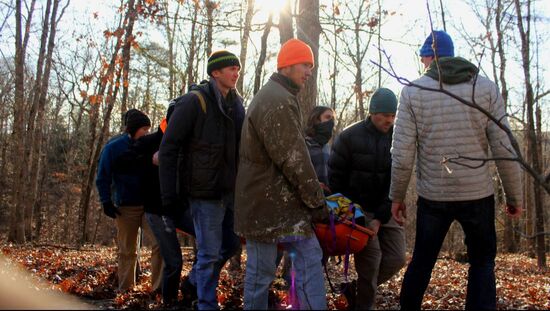By Joel Bates Awhile back, a popular movie came out depicting a gang of geriatric get-the-job-done’ers; over-the-hill henchmen; and ready-to-kick-the-bucket, karate-chopping assassins with an all-star cast of Hollywood has-beens. You see, the government needed some qualified, hardened men to complete a mission so deadly that it would virtually be suicide. When none of them showed up, the mission commander was left with “the expendables.” What made them so expendable? What makes any person expendable? In our day and age, it’s not popular to think of anyone as less valuable than someone else to the point that they should be sacrificed for the better good. I considered this during a recent evacuation in which six others and I carried an injured participant out of the wilderness. Darren had been struggling with fatigue and back pain for about 24 hours when on our last day of the missionary training expedition, he awoke with little feeling in the lower half of his body. My co-leader and I ran some tests to determine that he indeed was suffering from a neurological deficit. Our final destination, where a vehicle was waiting, lay only a half mile away, but the trail was rugged. I improvised a litter by lashing Darren in a hypo wrap and solicited the help of the trip participants in carrying him out. After quickly devising a plan, we were ready to transport our brother to the take out. The going was arduous as we bore our heavy burden over the rocky trail, all the while offering encouragement and comforting words to Darren through grimaced faces and clenched teeth displaying our physical strain. After an hour of traveling only about half way to our destination, we paused and set Darren down. One participant questioned our efforts; surely there was an easier way! Why were we expelling so much energy for the sake of one person? Couldn’t we just call in some “professionals” to finish the task. I reminded them that the “professionals” were simply people with the training and equipment to do what needed to be done. We, too, had training and equipment. Our equipment was a little more primitive, and our team’s experience consisted of on-the-job training, but the biggest difference was that we were in the here-and-now with the capacity to help. The question was not could we help or should we help, but would we help. No one said it would be easy. Obviously, there were no “professionals” around, so we lifted Darren and continued onward with our burden. Later that day back on camp and after some quality rest and ample doses of pain medication, our friend Darren was on his feet, walking gingerly around the lodge. One of the participants who had worked tirelessly to carry him out asked, “Why did we have to go through that only to have him up and walking now? Was there really anything even wrong with him in the first place?” “Good question,” I mused. Wouldn’t it have been more dramatic and given so much more purpose to our efforts if Darren had been critically injured, and we, a heroic band of rescuers, were the only thing that kept him from certain death? There would have been so much more depth to the sacrifice…so much more meaning to our suffering. However, one thing I knew: Earlier he couldn’t seem to walk and did need our help, and now he was better. “But it doesn’t feel worth all the effort,” the participant observed. It does if you are expendable! I find myself struggling with this concept of expendability. I’m ashamed to admit that I seldom commit to things without expecting to benefit personally. I feel entitled to my time, money, and way of life and balk at sacrificing them. It’s an epidemic in our culture, really. We want our church to meet our needs, not the other way around. We want to serve, but only if we can be a “servant leader.” We are so accustomed to expending energy on ourselves that we are quickly losing our way in the journey with Christ. He calls us to be expendable. I recently read a biography of Nate Saint, the famous missionary aviator who lost his life in Ecuador at the hands of the hostile natives he so badly wanted to win to Christ. During his time as a missionary, he was back in the United States on furlough traveling the nation and encouraging Christians to be expendable. He said, “You say I’m expendable as I give my life so recklessly to the cause of Christ on the mission field, but we are all expending ourselves on something. What are you expending yourself on?” That question marinates in my mind as I consider sacrificial work in the Kingdom of God. Thinking back to “The Expendables” movie, I have to ask, “Just why were they so expendable? Was it because they were old? Was it because they had no potential or very little to live for?” What I do know is that when called to the task they stood and said, “I will,” and they defeated the bad guys, won the day, and received copious amounts of fame and glory. That’s Hollywood’s version. The kingdom-of-God version looks a little more like what the Apostle Paul said in Romans 12, “…I urge you in view of God’s mercy to offer your bodies as living sacrifices, holy and pleasing to God--this is your spiritual act of worship.” It looks like Nate Saint expending his life and, as a result, an entire people group receiving the message of Jesus. It looks like pressing through personal inconvenience and discomfort when others will gain at your expense, knowing all along that your sacrifice is bringing a smile to the Savior’s face. It’s knowing with all your heart what Romans 8:32 says, “He who did not spare His own Son, but gave Him up for us all--how will He not also, along with Him, graciously give us all things?” I guess as it turns out, we expendables will enjoy in abundance something greater than fame and glory. We will fellowship with the greatest of all the expendables, Christ Jesus Himself.
1 Comment
|
Come along side us as we journey in and out of the wilderness, discovering our Creator in creation.
Archives
July 2024
Categories |
Contact Us
|
|

 RSS Feed
RSS Feed

